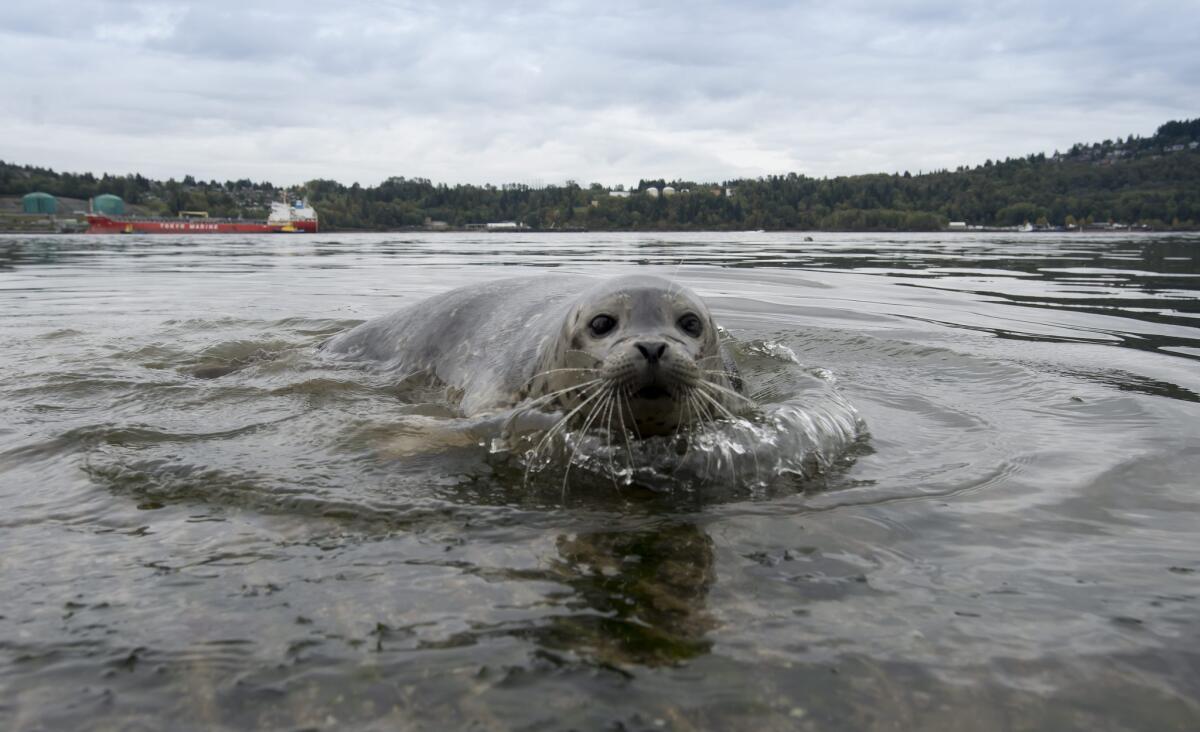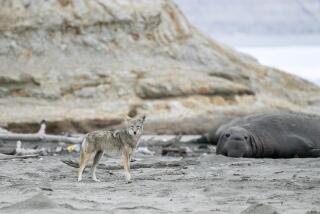Activists urge China to ban imports of Canadian seal products

A seal at Cates Park in North Vancouver, Canada. Activists say more than 2 million seals have been killed since 2002 — primarily for their fur, with 98% of them under 3 months old.
- Share via
reporting from Beijing — Animal rights activists are lobbying Beijing to ban imports of Canadian seal products, claiming that Chinese government action could permanently end the commercial trade in hunted seals.
Friday morning, representatives from Chinese and international animal rights groups held a news conference at a posh Beijing hotel to decry the Canadian-led commercial seal trade and “increase awareness” of its environmental consequences.
“Seals are in danger right now, and China has the power to save them,” said Gabriel Wildgen, a campaign manager for Humane Society International, Canada. “If China takes on this leadership role, it will not only be the first country in Asia to ban seal products, it will be the country to end the trade in seal products, once and for all.” (Although some seal species are endangered, harp seals, which are targeted by Canadian commercial hunters, are not; yet animal rights groups say that climate change and overhunting put them at risk.)
------------
For the Record
Dec. 18, 9:18 a.m.: An earlier version of this article incorrectly quoted Wildgen as saying that seals are “endangered” right now. He said they were “in danger.”
------------
Now Canada is beefing up efforts to promote seal skin, seal penis and seal oil to China, spending a lot of money.... Why doesn’t Canada ever get tired of promoting the seal trade?
— Qin Xiaona, director of the nonprofit Capital Animal Welfare Assn.
In recent years, Chinese grassroots movements against the trade and consumption of endangered species have gained surprising traction. Sales of shark fin — a delicacy in China — have dropped by up to 70% in recent years, according to a 2014 report by the advocacy group WildAid, helped at least in part by a series of widely aired anti-shark-fin advertisements featuring major Chinese celebrities including basketball superstar Yao Ming. In September, after years of lobbying by nonprofit organizations, President Obama and Chinese President Xi Jinping signed a deal to ban the import and export of elephant ivory.
Activists say more than 2 million seals have been killed since 2002 — primarily for their fur — with 98% of them under 3 months old. Because seal meat lacks a lucrative market, hunters often skin the animals and abandon their carcasses on the ice.
“The Canadian seal hunt is the world’s largest commercial slaughter of marine mammals,” said a 2012 journal article by British and Canadian veterinarians.
Join the conversation on Facebook >>
The European Union, U.S., Russia, Kazakhstan, Armenia, Mexico and Taiwan have already banned the trade in commercial seal products.
In China, the market for seal products remains small — only about $1 million per year, according to some experts — yet Canadian officials and executives see the country’s massive consumer base as a potential bright spot in a declining industry. This summer, a report by the Fur Institute of Canada urged Canadian officials to adopt a five-year plan that would involve culling seals in the southern Gulf of St. Lawrence and creating overseas markets for products made with their parts.
“The penises of juvenile and adult animals may be dried and sold as sexual enhancement products, particularly to Asian buyers,” said the report, according to the Globe and Mail, a Canadian newspaper.
“Because of the existence of the trade in seal products, businesses have promoted a so-called aphrodisiac quality of the seal penis, and the alleged durability of seal skins,” Hu Chunmei, head of the seal protection campaign at the Beijing-based nonprofit Green Beagle, said at a news conference. “These are unethical and unscientific commercial claims.”
Qin Xiaona, director of the nonprofit Capital Animal Welfare Assn., said the Canadian government began promoting seal meat to China in 2009, but received a frosty reception from food safety officials. “So seal meat has no market in China,” she said.
“Now Canada is beefing up efforts to promote seal skin, seal penis and seal oil to China, spending a lot of money on market development,” she added. “Why doesn’t Canada ever get tired of promoting the seal trade?”
Speakers at the news conference said they had received no word from Chinese authorities on the possibility of a ban.
“The Chinese government is the most powerful government in the world,” said Peter Li, China policy specialist for Humane Society International and associate professor of East Asian politics at University of Houston-Downtown. “If the Chinese government was determined to ban seal products, seal products would be absolutely gone here.”
Yingzhi Yang in the Times’ Beijing bureau contributed to this report.
ALSO
Air Force to allow non-officers to fly drones for first time
EU leaders scramble to save a signature achievement: Passport-free travel
San Bernardino shooter was a Pakistani who became known as a ‘Saudi girl’
More to Read
Sign up for Essential California
The most important California stories and recommendations in your inbox every morning.
You may occasionally receive promotional content from the Los Angeles Times.










